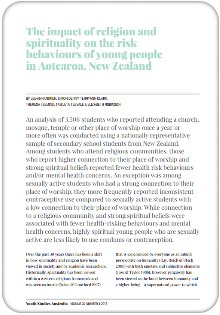Abstract
An analyses of 3506 students who reported attending a church, mosque, temple or other place of worship once a year or more often was conducted utilizing a nationally representative sample of secondary school students from New Zealand. Among students who attend religious communities, those who report higher connection to their place of worship and strong spiritual beliefs reported fewer health risk behaviours and/or mental health concerns. An exception was among sexually active students (28%, n=883) who had a strong connection to their place of worship more, frequently reported inconsistent contraceptive use (23.4%) compared to those who were sexually active with low connection to their place of worship (9.7%, p = 0.001). While connection to a religious community and strong spiritual beliefs were associated with fewer health risking behaviors and mental health concerns, highly spiritual young people who are sexually active are less likely to use condoms or contraception.


 Download
Download